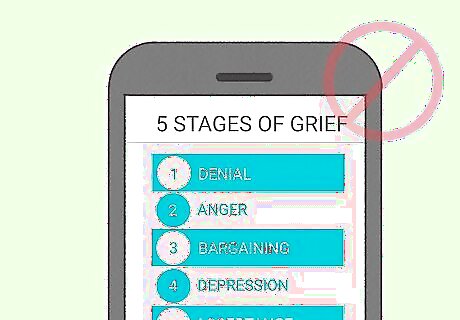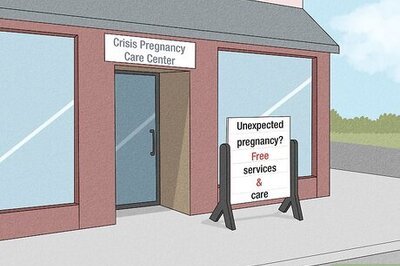
views
- Acknowledge your grief, sadness, anger, and any other feelings for what they are, and allow yourself to grieve in your own way and at your own pace.
- Surround yourself with friends and family and turn to them for support. Get extra help from a grief counselor or support group if you think it would benefit you.
- Do things to remember your parent, such as writing down your favorite memories with them, continuing their favorite traditions, or going to places they loved.
Grieve at your own speed.

There’s no specific timeline saying how long you should grieve. The death of a parent or another loved one can be hard to come to terms with for many people. Grieving is a completely natural response, and each person deals with these emotions at their own pace. Don’t set expectations for yourself in terms of how long you think is appropriate to grieve. Instead, be patient and gentle with yourself. For some people, it might just take a few weeks, while others might need a couple of months or even years to fully accept what happened. Grief is something that may never truly go away, and that’s okay. The important thing is that you find a healthy way to acknowledge and deal with the emotions you’re feeling. Listen to your heart when dealing with your grief. Don’t force yourself into doing things you don’t feel truly ready for. Even the smallest of steps are still progress.
Let yourself feel all of your emotions.

Acknowledging your emotions can help you cope with them. For some people, it’s a natural reaction to suppress intense emotions like sadness or anger in order to “stay strong” and keep moving forward. However, bottling up all of these feelings might just end up hurting you in the future and prevent you from ever reaching acceptance. Acknowledging your feelings and allowing yourself to be vulnerable in front of others may help you in accepting your loss, and it may even help others around you accept their own feelings. Dealing with such intense emotions can be overwhelming. As a possible solution, allow yourself to grieve in small increments every day. Take 20 or so minutes a day to let yourself grieve so that you can get more used to these heavy emotions. Crying doesn’t make you weak. It’s a natural human response to pain, whether it’s physical or emotional. Let yourself cry, as bottling up your emotions can just make you feel worse.
Establish a support system.

Lean on your friends and family during this difficult time. While it may not be easy at first to open up and talk about your loss, it’s important to remember that you have many friends and family members who love you and will be there to support you. They may be feeling a similar type of grief, and it can help all of you to sit down, talk about how you’re coping, and validate each other’s feelings. Just remember that you’re not alone in this. If your other parent is still with you, make sure to spend time with them and work to support each other. There’s no rush to get out and start spending time with others. Your friends and family will be there to help whenever you feel ready. It’s also okay to take some time to be by yourself. Always surrounding yourself with others can be overwhelming, so remember that it’s okay to be alone every once in a while.
Consider seeing a grief counselor.

A grief counselor can help you process your emotions. Some therapists or counselors specialize in helping people deal with loss. If you feel like your grief is trapping you and preventing you from moving forward, consider reaching out to a grief counselor for help. Though talking to your friends or family members can also help, sometimes getting the perspective of a person outside of your personal situation can help you take a new approach to the healing process. A grief counselor understands that there’s no one right way to mourn the loss of a loved one, and they can help you work through your grief at your own pace and in your own way.
Write your parent a letter.

Write your honest feelings to help you sort through your thoughts. Writing a letter to your parent about your feelings can be extremely cathartic and might help you sort through some of your more complicated emotions. Let out all of your thoughts and feelings onto the paper. Don’t hold back in expressing your sadness, anger, loneliness, or anything else you may be feeling. If you weren’t able to get a complete sense of closure after their passing, this letter is an opportunity to say the things that are still on your mind. Keep the letter in a safe place to read later if you think it’ll bring you comfort. Another option is to burn it as a symbolic gesture of letting your loved one go.
Take care of yourself physically.

Making sure your body is healthy can help you cope with grief. Be gentle with yourself and make sure you’re taking care of your physical well-being. Get 7 to 8 hours of sleep each night, eat 3 meals a day, and take time to exercise throughout the week to help work off any stress you may be feeling. While sleeping right and eating enough won’t make your grief disappear, it can certainly help give you the energy to get through each day. Finding ways to relax can also help you move through the grieving process and ease any stress or anxiety you may be feeling. Meditate, do yoga, go for a walk, or just sit down and read a book to help clear your mind for a little while. Avoid unhealthy coping mechanisms, such as turning to alcohol or drugs. Don’t be afraid to confide in your friends, family, or even a therapist if you feel like you can’t find a healthy way to cope.
Join a support group.

Find others who can relate to your story and support you. There are many support groups for people who have suffered the loss of a parent. Sometimes, a support group can offer you new methods of support that your friends or family might not be able to. It’s completely valid to feel like you may need this extra help, and you may even end up meeting people who are crucial to helping you move forward. For example, griefshare.org is a site that can help you locate nearby support groups for people who are dealing with the loss of a loved one.
Continue to pursue your interests and hobbies.

Doing the things you love can help you get back to your daily life. Grief brings a lot of emotional upheavals, and it’s natural to feel a bit lost as you try to navigate all of the intense emotions that come with losing a parent. Taking the time to get back into doing the things you love can help establish a sort of routine and nudge you towards the path of acceptance and moving forward. It’s understandable if some things you once did are now too painful to continue since they might remind you of your parent. In that case, break up your old routine and find a new hobby or activity you think you’ll enjoy. Use your hobbies and interests as a way to give yourself something to look forward to each day. While you may still feel down from time to time, having something fun and exciting planned can do wonders to lift your spirits.
Accept that grief comes in many forms.

It’s okay if you don’t experience the 5 stages of grief. It's true that there are 5 stages of grief: denial, anger, bargaining, depression, and acceptance, but that doesn't mean that you have to neatly go through each of those stages in order to truly deal with your loss. You may be angry or depressed first, feel denial later, or bargain after you feel depression—and there's nothing wrong with that. Or, you may grieve in a completely different way that deviates from these 5 stages. Everyone grieves in their own way and in their own time. Though you may not follow them exactly, having a basic understanding of the 5 stages of grief can help you better process your emotions.
Turn to your faith for comfort.

The mourning rituals of your faith can help you deal with loss. If you’re religious, turning to your community and the people within it for support can help you come to terms with your loss. Certain religions have specific rituals for mourning the death of a loved one, and you might be able to gain a sense of closure. Talking with other people in your community can also serve as a good reminder that you have many people who care about and love you. For example, you may want to arrange a funeral with a Mass if you’re Christian to honor your parent and provide an opportunity for everyone to come together to mourn. If you practice Hinduism, you might get a sense of closure from performing mukhagni (cremation) and scattering your parent’s ashes over a place that was important to them. Even if you don’t follow a religion, you can still do your own personal rituals. This can include things like: Holding a memorial service where people can share their fond memories of your parent Gathering friends and family together for a meal in remembrance of your parent Decorating the grave site with loved ones
Find ways to remember them.

Continue traditions and tell stories to keep your parent close to you. No matter what has happened, your parent will always continue to be a big part of your life. To help you remember them, write down your favorite memories together, make a scrapbook about your time together, or share stories about them with other friends and family. Do whatever you need to keep their memory alive and honor them in a way that makes you feel satisfied and complete. Another suggestion would be to get involved in charity and volunteer work that your parent was very passionate about to keep their legacy and loving nature alive.
Prepare for your grief to come back at times.

Certain things can trigger your grief even years later. For example, your parent’s birthday or a holiday like Thanksgiving, Father’s Day, or Mother’s Day might be hard for you even after a couple of years have passed. Or, maybe doing an activity you and your parent used to do together, such as going to a baseball game or shopping, can make you unexpectedly emotional. When this happens, reach out to others and don’t hesitate to surround yourself with people who can help you. For some, it can feel like they’re replacing their parent by making new memories over the old ones they shared together. But just remember that your life is meant to be lived. You’re not forgetting your parent by continuing to do the things you once did together. If anything, you’re making even more happy memories to add to the ones you hold close to your heart.












Comments
0 comment